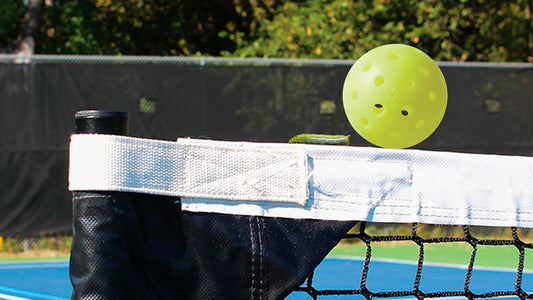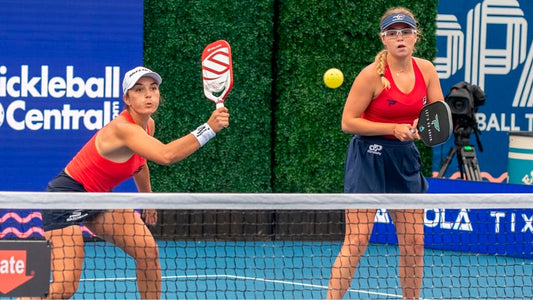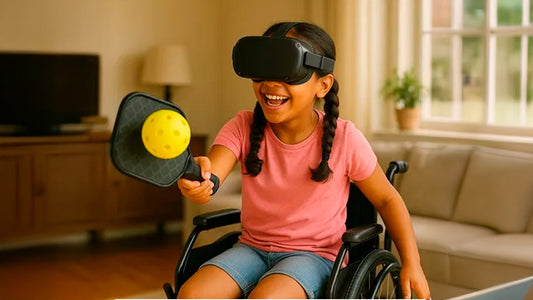
The Best Age to Start Playing Pickleball
Share
“Age is no barrier. It’s a limitation you put on your mind.” – Jackie Joyner-Kersee
Pickleball is one of the most inclusive sports around, welcoming players of all ages to enjoy the game. Whether you’re five, fifty, or even beyond seventy, pickleball offers fun, fitness, and mental engagement for everyone. So, what is the best age to start playing pickleball? The short answer: there’s no “right” age, but certain ages may offer unique benefits for getting started. Let’s explore why pickleball is a great fit at any age and how each life stage brings its own set of advantages.
Why Pickleball is a Sport for All Ages
Pickleball is a sport that combines elements of tennis, badminton, and table tennis, played on a smaller court with a paddle and a plastic ball. Its simplicity and adaptability make it ideal for players of all skill levels and physical abilities. Here are a few reasons why it’s accessible to people of all ages:
- Low-Impact Movements: Pickleball involves less impact than many other racquet sports, making it easier on the joints. This appeals to older players or those with physical limitations.
- Quick Learning Curve: The rules are easy to learn, and beginners can start playing with a few simple instructions.
- Social and Community-Oriented: Pickleball is known for its welcoming and social atmosphere, where players can form connections on and off the court.
Starting Young: Pickleball for Kids and Teens
For younger players, typically ages 5 to 18, pickleball offers an early introduction to teamwork, coordination, and agility. Starting at a young age allows kids and teens to develop essential motor skills and hand-eye coordination, which can help them in other sports as well.
- Coordination and Agility: Learning to play pickleball at a young age helps kids develop physical coordination and agility, which are beneficial in other sports.
- Social Skills and Teamwork: Pickleball encourages kids to communicate and strategize with teammates, building confidence and social skills.
- Focus and Discipline: Practicing serves, learning court positioning, and improving shot accuracy instill focus and discipline in young players.
Many schools and community programs offer pickleball lessons for kids and teens, making it easy for parents to get their children involved in the sport.
Pickleball for Adults: Ages 20 to 50
For adults in their 20s, 30s, and 40s, pickleball offers a fun and challenging way to stay active while balancing the demands of work and family. This age group benefits from the cardio and strength workout that pickleball provides without the intense impact of other sports.
- Great Cardio and Muscle Engagement: Adults get a full-body workout from pickleball, building strength and endurance through dynamic movements and quick reflexes.
- Stress Relief: The social and recreational aspect of pickleball helps relieve stress, making it an ideal outlet for those balancing careers, family, and daily responsibilities.
- Accessible for All Fitness Levels: Whether you’re a seasoned athlete or just starting to get active, pickleball accommodates various fitness levels. Its low impact on joints makes it accessible, even for those returning to exercise after some time off.
Pickleball also offers adults the opportunity to engage in a healthy, competitive sport with friends, family, or even in local leagues, adding a social dimension to the game.
Pickleball for Older Adults and Seniors: 50+
Pickleball is widely popular among seniors, thanks to its low-impact movements, moderate pace, and easy-to-learn rules. In fact, many senior communities and recreation centers now have pickleball courts and organized games, reflecting the sport’s appeal for older adults.
- Low Impact, High Reward: Pickleball provides a cardio workout that’s gentle on the knees, hips, and ankles, making it suitable for people with arthritis or joint concerns.
- Mental Engagement: The strategy involved in pickleball keeps the mind sharp, helping seniors improve their focus and cognitive health.
- Social Interaction: The pickleball community is welcoming and social, offering older adults a chance to build friendships and stay connected.
- Improved Balance and Agility: Playing pickleball regularly helps seniors improve balance and agility, reducing the risk of falls and promoting overall stability.
Seniors who play pickleball often find that it enhances both their physical health and social well-being, creating a fulfilling experience that promotes a balanced lifestyle.
Tips for Starting Pickleball at Any Age
No matter when you decide to pick up a paddle, here are a few tips for getting started:
- Take a Beginner’s Class: Most local pickleball clubs and recreation centers offer beginner classes. Starting with instruction can help you learn the basics quickly.
- Practice Court Positioning: Pickleball is as much about positioning as it is about hitting. Learning to move efficiently on the court helps you play better and avoid unnecessary strain.
- Get the Right Gear: Make sure you have a paddle that suits your skill level and comfortable, non-slip court shoes.
- Stay Consistent: Practice regularly to improve your skills, fitness, and overall enjoyment of the game. Even a few sessions per week can make a difference.
- Join a Group: Playing with others makes the game more enjoyable and helps you learn faster. Many communities have pickleball clubs that welcome new players.
Game Point
The best age to start playing pickleball is… any age! Whether you’re introducing a child to the game or picking up a paddle for the first time as an adult or senior, pickleball offers countless physical, mental, and social benefits. With its inclusive nature, low-impact exercise, and friendly community, pickleball is truly a lifelong sport that everyone can enjoy.
So, grab a paddle, find a local court, and experience all that pickleball has to offer, no matter where you are in life.
See you on the courts!



